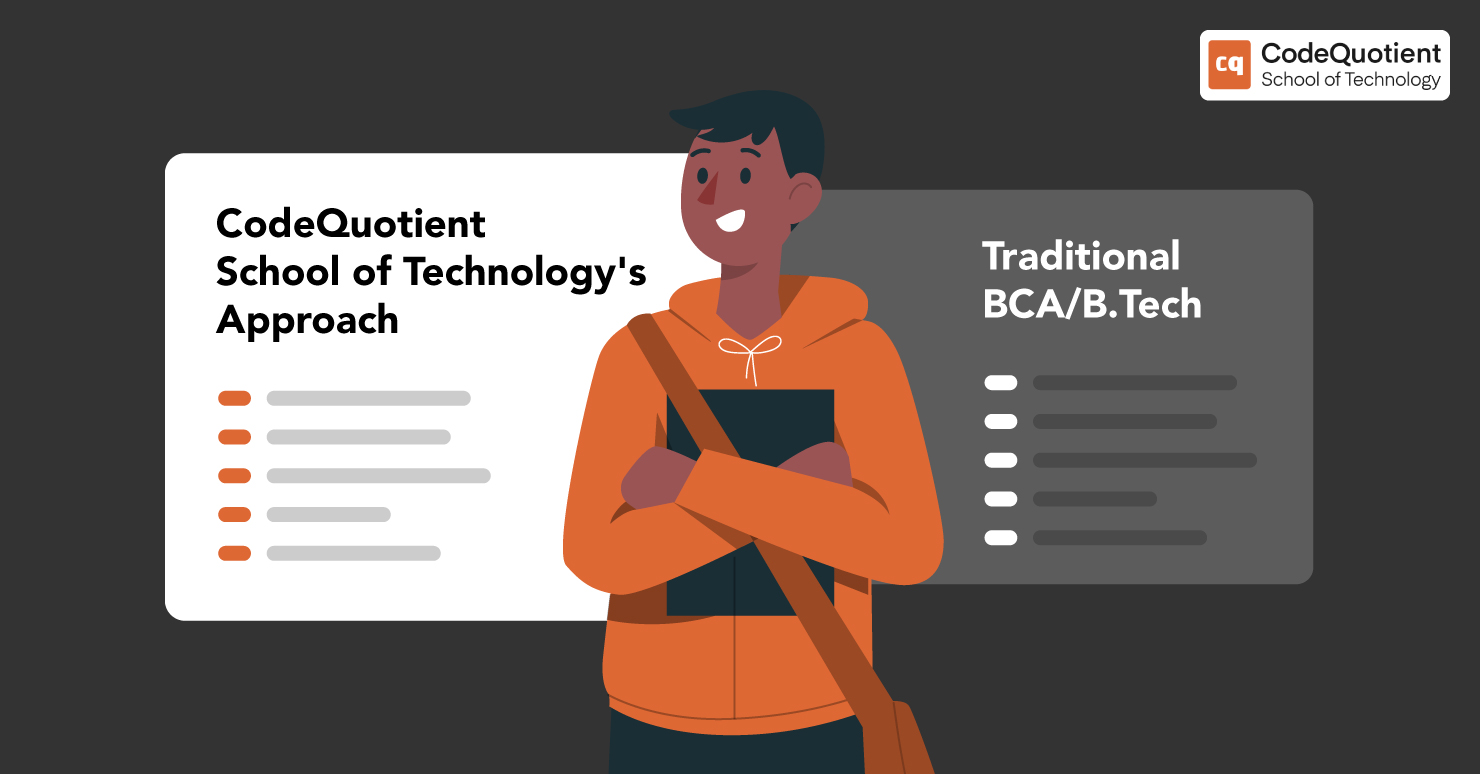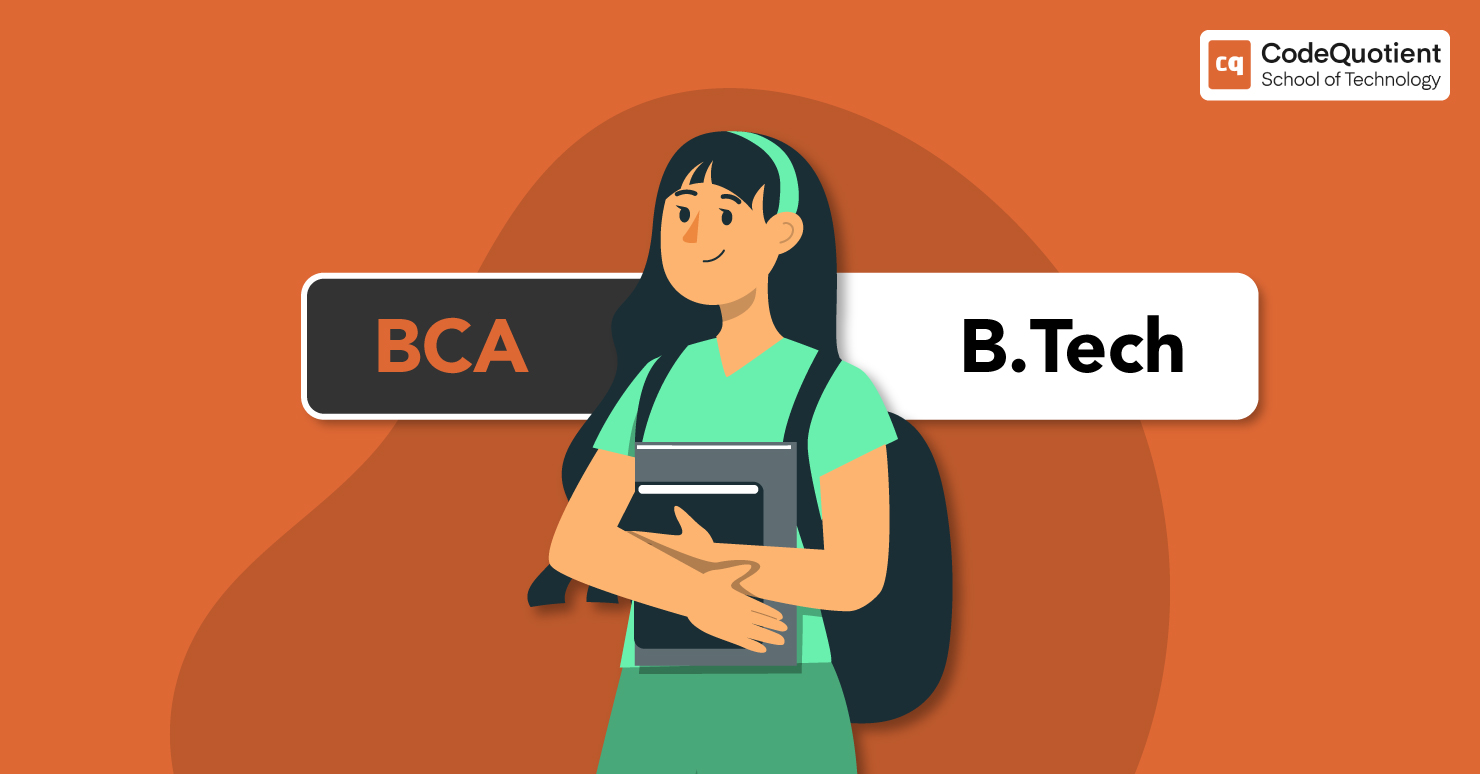BCA vs. B.Tech—this undergraduate degree dilemma confuses many students who wish to build careers in the field of engineering. However, understanding the core differences between these academic programs is key before you block your calendar for counselling sessions and campus tours.
Questions like: Should I pursue the more coding-focused BCA or go for the engineering rigour of B.Tech to become a software engineer? How do the course structures, specialisations, fees, and career prospects stack up against each other? What skills or software languages will truly make me industry-ready? Continue to puzzle students seeking clarity.
But not anymore!
We’ll explore an in-depth comparison of these two competitive undergraduate programs to help tech-savvy students like you make an informed choice. So, let’s get started now!
BCA vs B.Tech: Understanding Course Structures
The course structure and curriculum give you a clear idea of the nature of the learning involved and the subjects covered under a program. Let’s examine the course components for BCA and BTech :
1. BCA Program Structure
- Curriculum Overview: The BCA curriculum strongly emphasises IT applications and computer programming languages. Core subjects include programming fundamentals, database management, operating systems, data structures, computer architecture, and algorithms. However, it lacks practical hands-on learning.
- Specialisations and Electives: BCA allows electives and specialisations in areas such as financial computing, IoT, data science, cyber security, cloud computing, and multimedia.
- Duration and Internship Opportunities: The BCA program is generally three years long, with an option for a six-month internship in the final year.
2. B.Tech Program Structure
- Curriculum Overview: B.Tech extensively covers mathematics, programming, electronics, engineering principles, and management. Core subjects include data structures, OS, networking, and DBMS, along with specialised engineering subjects.
- Specialisations and Electives: In the latter years, B.Tech offers specialisation options in computer science, information technology, artificial intelligence, machine learning, data science, and cyber security, among others.
- Duration and Internship Opportunities: B.Tech is a 4-year program providing a 1-year industry internship.
3. Comparative Analysis of Course Structures
In a nutshell, BCA focuses more on IT applications, programming languages, and computer system knowledge, while B. Tech covers both software and hardware aspects in greater depth, along with general engineering principles.
While BCA internships are shorter, B.Tech internships are longer. In terms of specialisations, B.Tech offers greater flexibility and choices.
Evaluating Fees and Financial Aspects
Fees are often an important consideration when making a decision. Let’s compare the tuition fees and other costs associated with BCA vs B.Tech programs.
1. Tuition Fees for traditional BCA Programs
The average annual fees for BCA in Indian Institutes range from Rs. 25,000 to Rs. 1 lakh based on the college or university.
2. Tuition Fees for traditional B.Tech Programs
The typical B.Tech tuition fee in Indian institutes is Rs. 1 – 4 lakhs annually. IITs and top NITs charge upward of Rs. 2 lakhs per year.
3. Additional Expenses and Scholarships
Additional costs like hostel fees, mess charges, books and supplies need to be factored in. Merit scholarships can help offset some expenses.
4. Exploring Sponsorship Opportunities
Certain institutions and companies also provide sponsorship support or fee waivers for deserving students in B.Tech programs.
Overall, BCA proves to be more economical than B.Tech in terms of tuition fees and living expenses. But B.Tech graduates typically earn higher salaries, which justifies the higher education investment.
Career Prospects: BCA vs B.Tech
The career opportunities and recruitment landscape are pivotal in choosing between BCA and B.Tech. Here’s an outlook on careers after graduation:
1. Career Trajectory after BCA vs B.Tech Graduation
BCA graduates can work as software developers, web developers, systems analysts, IT consultants, database administrators, project associates/coordinators, technical writers, etc. in IT companies. After completing a BCA, one can also pursue an MCA or MBA for further specialisation. The average starting salary after BCA ranges between Rs. 2.5-3.5 lakhs per annum.
B.Tech graduates can work in IT and engineering roles like software developer, data scientist, AI/ML engineer, IoT engineer, product developer, project manager, business analyst, etc.
The B.Tech degree provides a route to core technical and research roles. The average B.Tech fresher salary is Rs. 2.5-6 lakhs annually.
2. Industry Relevance and Demand Analysis
Due to rapid digital transformation, both BCA and B.Tech graduates are in demand. However, on average, B.Tech graduates have an edge over BCA graduates in recruitment in certain technology domains.
However, BCA professionals have sufficient skills to build successful careers in the IT industry.
CodeQuotient’s Unique Program
When choosing between BCA and B.Tech, there is an innovative option that blends the best of both academic programs. CodeQuotient School of Technology offers a Bachelor of Computer Applications (BCA) + UG Program in Software Engineering.
Overview of CodeQuotient’s Program
This unique UGP-SE + BCA program aims to provide comprehensive learning and hands-on training tailored to the industry.
1. Unique Features and Integration
The BCA+UGP-SE focuses on advancing software engineering skills via industry mentorship, real-world projects, and intensive internships. The BCA component covers essential computer application knowledge as per the curriculum.
2. Structure: UGP-SE in Collaboration with BCA
Students undergo UGP-SE training in the first two years to gain core technology expertise. This is integrated with mandatory BCA subjects per degree completion guidelines. Also, the final year involves paid internships.
3. Specialisations and Skill Enhancement
Students can choose electives and specialise in futuristic technologies like data science, cloud computing, IoT, and cyber security during the program while honing programming skills.
Comparative Analysis: CodeQuotient’s Approach vs Traditional BCA/B.Tech

CodeQuotient School of Technology’s UGP-SE integrated BCA program offers the best of both worlds in terms of technical excellence and academic degrees. Here’s a comparative analysis of key aspects:
1. Blending Academic Learning with Industry Experience
While BCA and B.Tech are more theoretical, CodeQuotient’s program provides extensive hands-on learning and real-world training from day one through expert mentorship and industry collaborations.
2. Internship Opportunities and Real-world Projects
CodeQuotient provides opportunities to work on actual industry projects and intensive 12-18 months of internships. Traditional BCA/B. Tech has shorter internships.
3. Sponsorship and Financial Support
CodeQuotient prepares students for direct employment with hiring partners who can sponsor the tuition fees. Traditional B.Tech has limited sponsorship.
4. Integration of Specialised Tracks and Emerging Technologies
Training in new-age skills like AI/ML, data science, and cloud computing with ample opportunities for live projects.
On successful completion of the program, students will gain:
- Undergraduate Certificate in Software Engineering by CodeQuotient
- UGC-Recognised 3-year BCA Degree
- This dual advantage provides the edge over traditional BCA vs B.Tech alone.
Choose Wisely and Build a Brighter Future!
While this article discusses BCA vs. B.Tech, needless to say, both these courses have their own merits and career prospects for aspiring computer science students. CodeQuotient‘s innovative BCA + UG Program in Software Engineering offers the best of both worlds and is an excellent choice for aspiring software engineers.
The hands-on learning focus, extensive internships, emerging technologies specialisation, and potential funding make it a compelling choice. Our program can be the right fit for talented students keen on successful tech careers.
Reach out to us to know more about the program and the application process.




